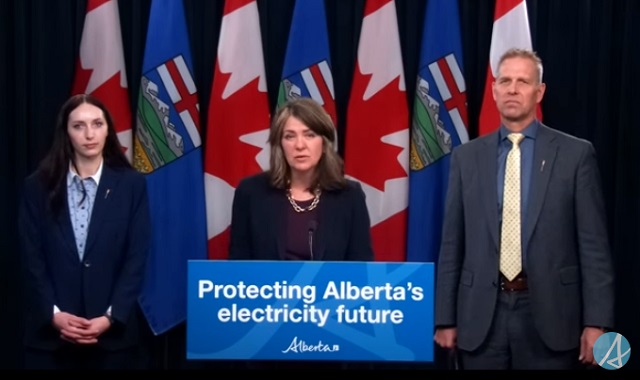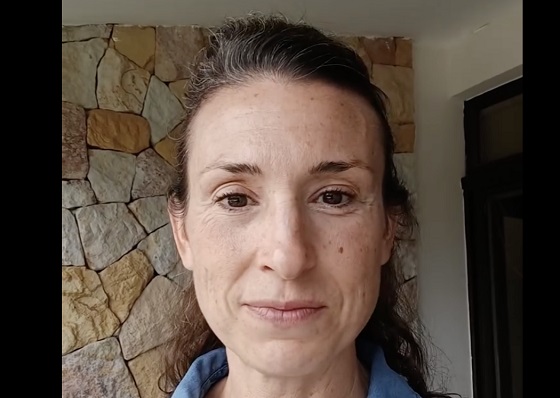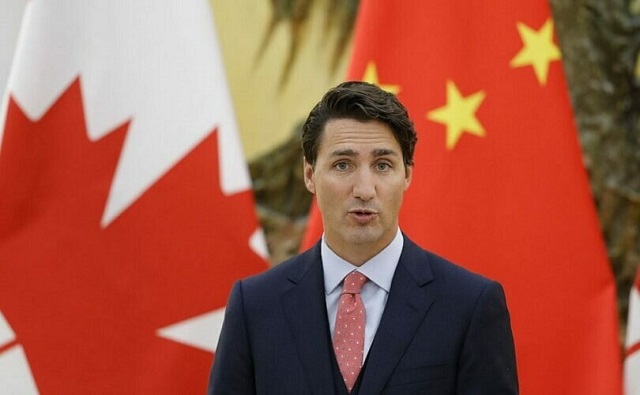Alberta
Alberta NDP have their own Just Transition plan – Project Confederation

From Josh Andrus, Executive Director of Project Confederation
Look what we discovered about the “Just Transition”…
You might remember, not so long ago, that federal Natural Resources Minister, Jonathan Wilkinson, announced that the federal Liberal government would soon be rolling out its plan for a “Just Transition.”
This is the “Just Transition” plan that the federal NDP insisted be included in the “confidence and supply agreement” that is currently propping up Justin Trudeau’s minority government.
Then, an internal government memo was made public, suggesting that hundreds of thousands of jobs will be lost in this “transition” – particularly in western Canada.
Project Confederation immediately sprung to action, investigating the proposed policies and launching a petition against the plan, which has now received more than 13,000 signatures.
(If you haven’t signed the petition yet, you can do so here)
As news spread, Alberta Premier Danielle Smith, and Saskatchewan Premier Scott Moe spoke out strongly against the plan.
But one politician was suspiciously quiet – the Alberta NDP leader, Rachel Notley.
We thought Albertans, and Canadians, deserved to know whether someone running to be Premier of Alberta supported the shutting down of Alberta and western Canada’s largest industry.
And so we pushed hard for Rachel Notley to answer the question – does she support the “Just Transition” idea?
But, as time went on, Notley’s silence became more and more deafening.
Eventually, her silence became so deafening that even some in the media began to question whether or not she truly disagreed with the plan.
Hours turned into days, and days turned into weeks – literally!
Two full weeks after Wilkinson’s announcement, Rachel Notley finally broke her silence, calling on Ottawa to “put the brakes on” the “Just Transition”.
But, “put the brakes on” sounded a lot more like “wait until after the Alberta election” than “ditch it entirely” to us.
So we decided to do some more digging.
Well, after some excellent work by our research team, we think we now know why it took so long for Rachel Notley to oppose the “Just Transition.”
It turns out that, rather than just being some federal NDP idea that she’s now distanced her provincial party from, the “Just Transition” was actually a huge part of her NDP government’s plans.
Insert flashback music here.
It’s November 2015, the newly minted NDP government are celebrating a big election win, and are moving forward with their climate change strategy.
(You know, the one they accidentally forgot to mention that they were going to implement if they won).
New Alberta Minister of Environment and Parks, Shannon Phillips, commissions a blue-ribbon report by a team of high-profile academics, to help the NDP figure out exactly how to fulfil their campaign promise (sorry, their campaign omission).
Several months later, the “Climate Leadership Report” is released, setting out the government’s vision for climate policy and – guess what?
The “Just Transition” is a key part of the NDP’s Climate Leadership Report!
Yep, that’s right – forget not knowing what the “Just Transition” is, and claiming not to support the federal government’s plan.
In reality, it was Rachel Notley’s government who wrote the policy in the first place, and then made it a critical part of their entire environmental policy agenda.
Here are some extracts from the report…
In a section discussing mitigating the impacts of carbon pricing on low- and middle-income Albertans, the NDP said they would “support a sound and just transition for labour and communities…”

Later in the report, the authors highlight a quote from their friends at the Alberta Federation of Labour.
This quote is really just one gigantic contradiction, given the government is literally legislating their employment out of existence:

Next, the report talks about what the workers who lose their jobs might need to do as part of this “transition” – it notes that they may need assistance with “relocation”:

Oh, sorry, did the government legislate away your job?
Not to worry, we’ll “fix” it for you by helping you walk away from your entire life and move somewhere else.
Remember how Rachel Notley said Albertans might have to move to BC to find work while she was Premier?
Yeah, we’d prefer Albertans could find work here in Alberta, thanks.
*****
Here’s the thing…
Not only did the Alberta NDP support the concept of a federal “Just Transition” when they were in government, they were also actively implementing their own “Just Transition” – 8 years earlier than the federal government!
And yet now they claim to not support the idea at all?
No wonder it took so long for Rachel Notley to answer the question.
She was probably just surprised that no one in the media had dug up her own support of “Just Transition” legislation from years before, and was wondering if she could get away with pretending she hadn’t.
Well, we’re not surprised no one in the media bothered looking.
But, we did look, and thank goodness we did!
Thank you to our researchers who dug up this document, which I’m sure the NDP would have preferred we’d not found.
If you’d like to help us do even more research like this, please click here to make a donation to our work.
Otherwise, if you haven’t signed the No Unjust Transition petition yet, please click here to do so now.
Rachel Notley’s claim to now be opposed to the exact thing that she herself implemented is not credible.
She can run from it, but she can’t hide.
Her environmental policies put Alberta into one of its deepest recessions ever.
And we can’t afford to repeat those mistakes.
Sincerely,
Josh Andrus
Executive Director
Project Confederation
Alberta
Province to stop municipalities overcharging on utility bills

Making utility bills more affordableAlberta’s government is taking action to protect Alberta’s ratepayers by introducing legislation to lower and stabilize local access fees. Affordability is a top priority for Alberta’s government, with the cost of utilities being a large focus. By introducing legislation to help reduce the cost of utility bills, the government is continuing to follow through on its commitment to make life more affordable for Albertans. This is in addition to the new short-term measures to prevent spikes in electricity prices and will help ensure long-term affordability for Albertans’ basic household expenses.
Local access fees are functioning as a regressive municipal tax that consumers pay on their utility bills. It is unacceptable for municipalities to be raking in hundreds of millions in surplus revenue off the backs of Alberta’s ratepayers and cause their utility bills to be unpredictable costs by tying their fees to a variable rate. Calgarians paid $240 in local access fees on average in 2023, compared to the $75 on average in Edmonton, thanks to Calgary’s formula relying on a variable rate. This led to $186 million more in fees being collected by the City of Calgary than expected.
To protect Alberta’s ratepayers, the Government of Alberta is introducing the Utilities Affordability Statutes Amendment Act, 2024. If passed, this legislation would promote long-term affordability and predictability for utility bills by prohibiting the use of variable rates when calculating municipalities’ local access fees. Variable rates are highly volatile, which results in wildly fluctuating electricity bills. When municipalities use this rate to calculate their local access fees, it results in higher bills for Albertans and less certainty in families’ budgets. These proposed changes would standardize how municipal fees are calculated across the province, and align with most municipalities’ current formulas.
If passed, the Utilities Affordability Statutes Amendment Act, 2024 would prevent municipalities from attempting to take advantage of Alberta’s ratepayers in the future. It would amend sections of the Electric Utilities Act and Gas Utilities Act to ensure that the Alberta Utilities Commission has stronger regulatory oversight on how these municipal fees are calculated and applied, ensuring Alberta ratepayer’s best interests are protected.
If passed, this legislation would also amend sections of the Alberta Utilities Commission Act, the Electric Utilities Act, Government Organizations Act and the Regulated Rate Option Stability Act to replace the terms “Regulated Rate Option”, “RRO”, and “Regulated Rate Provider” with “Rate of Last Resort” and “Rate of Last Resort Provider” as applicable. Quick facts
Related information |
Alberta
Alberta moves to protect Edmonton park from Trudeau government’s ‘diversity’ plan

From LifeSiteNews
If Trudeau’s National Urban Park Initiative is implemented, Alberta could see its parks, including Edmonton’s River Valley, hijacked by the federal government in the name of ‘sustainability, conservation, equity, diversity, inclusion, and reconciliation.’
Edmonton is working to protect its River Valley from the Trudeau government’s “diversity” park plan.
On April 15, Alberta Legislature passed MLA Brandon Lunty’s private members’ Bill 204 to protect the Edmonton River Valley from Prime Minister Justin Trudeau’s National Urban Park Initiative which would give the federal government power over provincial parks to enforce a variety of quotas related to the “climate” and “diversity.”
“Albertans elected our United Conservative government with a majority mandate to, among other things, protect families and communities from federal overreach and intrusion. That’s exactly what this bill accomplishes,” Lunty said in a press release.
Bill 204, titled the Municipal Government (National Urban Parks) Amendment Act, is a response to the National Urban Park Initiative which would give the Trudeau government jurisdiction over Alberta’s provincial parks.
The Trudeau government’s plan promises to “provide long-lasting benefits to the urban area” by using “sustainability, conservation, equity, diversity, inclusion, and reconciliation.”
If the program is approved, the Edmonton River Valley could be “fully owned by the Federal Government,” which will use the space to advance their values, including addressing the impacts of “climate change” and creating spaces where “diversity is welcomed.”
The plan also promises that equity will be “intentionally advanced” while “respecting indigenous rights” through “reconciliation.”
However, many Edmonton citizens were concerned with the Urban Park Initiative and met with their MLAs to discuss the issue.
Edmonton citizen Sheila Phimester worked with MLA Jackie Lovely to create a petition to prevent the River Valley from becoming federally owned. The petition has received over 5,000 signatures.
“Instead of Edmontonians making decisions about what happens in the park, Ottawa would be making the decisions,” the petition warned.
“Oh, and because it’s the federal government, their ‘priorities’ for these parks are ‘healthier communities’, ‘climate resilience’, ‘reconciliation’, ‘equity’, ‘diversity’, and ‘inclusion,’” it continued.
Already, Trudeau has attempted to assert power over Alberta’s industry by placing “climate” restrictions on their oil and gas production in an attempt to force net-zero regulations on all Canadian provinces, including on electricity generation, by as early as 2035.
However, Alberta Premier Danielle Smith has repeatedly vowed to protect the province from Trudeau’s radical “net zero” push.
In December, Alberta Premier Danielle Smith blasted Trudeau’s Environment Minister Steven Guilbeault’s plan to slash oil and gas emissions by 35 percent to 38 percent below 2019 levels as “unrealistic” and “unconstitutional.”
Trudeau’s current environmental goals are in lockstep with the United Nations’ “2030 Agenda for Sustainable Development” and include phasing out coal-fired power plants, reducing fertilizer usage, and curbing natural gas use over the coming decades.
The reduction and eventual elimination of the use of so-called “fossil fuels” and a transition to unreliable “green” energy has also been pushed by the World Economic Forum (WEF) – the globalist group behind the socialist “Great Reset” agenda – an organization in which Trudeau and some of his cabinet are involved.
In November, after announcing she had “enough” of Trudeau’s extreme environmental rules, Smith said her province had no choice but to assert control over its electricity grid to combat federal overreach by enacting its Sovereignty Act. The Sovereignty Act serves to shield Albertans from future power blackouts due to federal government overreach.
Unlike most provinces in Canada, Alberta’s electricity industry is nearly fully deregulated. However, the government still has the ability to take control of it at a moment’s notice.
-

 Frontier Centre for Public Policy1 day ago
Frontier Centre for Public Policy1 day agoThe tale of two teachers
-

 COVID-192 days ago
COVID-192 days agoJapanese study finds ‘significant increases’ in cancer deaths after third mRNA COVID doses
-

 Brownstone Institute2 days ago
Brownstone Institute2 days agoPfizer Lied to Us Again
-

 Brownstone Institute2 days ago
Brownstone Institute2 days agoDid Lockdowns Set a Global Revolt in Motion?
-

 Brownstone Institute1 day ago
Brownstone Institute1 day agoIs the Overton Window Real, Imagined, or Constructed?
-

 Alberta14 hours ago
Alberta14 hours agoAlberta moves to protect Edmonton park from Trudeau government’s ‘diversity’ plan
-

 Alberta4 hours ago
Alberta4 hours agoProvince to stop municipalities overcharging on utility bills
-

 Business14 hours ago
Business14 hours agoMaxime Bernier warns Canadians of Trudeau’s plan to implement WEF global tax regime









